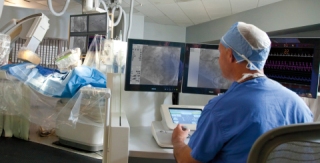Jan 7 2016
Corindus Vascular Robotics, Inc. today announced the launch of a CorPath® robotic-assisted coronary intervention program at Massachusetts General Hospital and the installation of its first CorPath System.
 Physician seated in radiation-shielded control cockpit of CorPath System. (Graphic: Business Wire)
Physician seated in radiation-shielded control cockpit of CorPath System. (Graphic: Business Wire)
Involvement in the robotic-assisted coronary intervention program will allow physicians at MGH to perform percutaneous coronary interventions (PCI) using the CorPath System while protected from radiation exposure in the system's radiation-shielded control cockpit.
The CorPath System is the first and only FDA-cleared medical device to bring robotic-assisted precision to PCI procedures while protecting medical professionals from radiation exposure occurring in hospital catheterization laboratories. The CorPath robotic-assisted coronary intervention program at MGH brings the safety and benefits of the CorPath System to cath lab patients and workers today, as well as creating opportunities for furthering the technology in the future.
"Emerging technologies should contribute to the well-being of patients and physicians," said Doug Drachman, MD, Director of MGH’s Cardiovascular Fellowship Program. "Robotic assistance provides enhanced visualization and potentially increased accuracy. Coupled with radiation reduction for clinicians, these advances may not only improve care, but also the long term health of patient and provider."
Today, interventional procedures performed in hospital cath labs are a leading source of radiation exposure for medical personnel which has been linked to the development of cataracts, cancer, and brain and thyroid diseases. The CorPath System allows interventional cardiologists to perform procedures in a protected cockpit just a few feet away from the patient bed side. Seated in the radiation-protected cockpit, the physician uses intuitive digital controls to robotically advance guidewires, angioplasty balloons and stents through coronary arteries.
"Leading institutions such as MGH routinely perform long, complex procedures, which may have the most opportunity to benefit from the precision, reduced radiation exposure, and ergonomics afforded by vascular robotics," said David Handler, President and Chief Executive Officer of Corindus. "Collaboration between Corindus and a leading clinical facility such as MGH can accelerate the education, awareness and adoption of this important technology in cath labs throughout the United States and beyond."